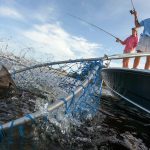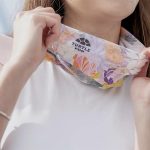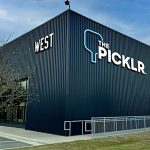Gap Inc. announced that it will derive 100 percent of its cotton from more sustainable sources by 2025 across its banners.
Cotton’s strong fibers are used in a significant portion of products across Gap Inc. brands, and its cultivation spurs economic opportunity by supporting livelihoods in many communities. However, much of the world’s cotton is grown in areas where people have difficulty accessing clean water due to pollution and droughts – a situation further exacerbated by climate change. By sourcing sustainably farmed and sourced cotton, the company is supporting farmers who use water efficiently through better irrigation practices.
“We’re proud to support innovations that protect natural resources and foster cleaner, safer communities for families around the world,” said Keith White, Gap Inc.’s executive vice president of global sustainability. “Sourcing cotton in a way that reduces water use and damage to the climate is about creating a healthy environment for our children and future generations.”
For most people, cotton is a part of their daily lives, from the bed linens they sleep on, to the pants and jackets they wear. Yet, cotton is one of the most water-intensive crops grown. Currently, a single pair of jeans uses an average of 1,600 gallons of water throughout its full life cycle1, 64 percent of which is used to grow cotton.
Gap Inc.’s commitment to sustainability includes sourcing Better Cotton Initiative (BCI) cotton, and cotton that is organic, recycled, and verified American or Australian grown.
Gap Inc. began sourcing Better Cotton in 2016. BCI is a long-term multi-stakeholder initiative that develops and promotes good farm practices, allowing more cotton to be grown while reducing water and chemical use and protecting both working conditions and biodiversity. In BCI’s latest global ranking of top companies who source sustainably grown BCI cotton by volume, Gap Inc. ranked #4. Gap Inc. also has a manufacturing goal to conserve a total of 10 billion liters of water by the end of 2020; those water savings would be the equivalent volume of the daily drinking water needed for 5 billion people.
Today’s announcement builds on commitments already established by several Gap Inc. brands. In fact, by 2021, Gap brand is committed to sourcing 100 percent of its cotton from more sustainable sources. Old Navy will also increase its sourcing of sustainable cotton to 100 percent by 2022, and Banana Republic will source 100 percent of its cotton from more sustainable sources by 2023. In May, Gap Inc. CEO Art Peck announced that Old Navy, Gap, and Banana Republic are launching denim with 5 percent post-consumer mechanically-recycled cotton content.
Gap Inc. has been evolving its sustainability program since the early 1990s, when it developed labor standards for garment manufacturers in its supply chain. Athleta, Gap Inc.’s fastest growing brand, earned B Corp Certification last year in recognition of its exceptional commitment to protecting the planet, while empowering women and girls to reach their limitless potential. Athleta is now one of the largest apparel brands in the world to certify as a Certified B Corporation. Hill City, the company’s newest menswear lifestyle brand, also launched as a B Corp brand by integrating sustainability throughout its business. Additionally, in December 2018, Gap Inc. was one of 43 founding signatories of the Fashion Industry Charter for Climate Action.
Gap’s businesses include the Old Navy, Gap, Banana Republic, Athleta, Intermix, Janie and Jack, and Hill City brands. F













